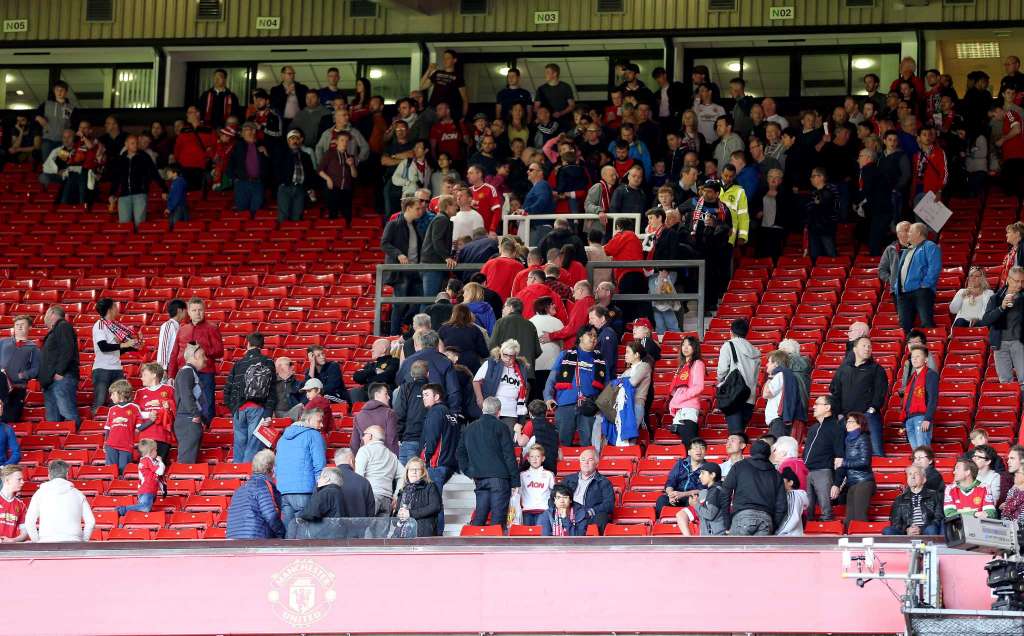Police evacuated Manchester United’s home stadium on the final day of the English Premier League season and dismantled a fake bomb Sunday just days after Britain raised its terror alert against Irish extremism.
Police initially described the device as “incredibly lifelike” as Manchester United’s planned match with Bournemouth was cancelled, to boos from some fans. Four hours later, bomb technicians reported that the device was a hoax.
Security has been tightened at Premier League stadiums following last year’s Paris attacks that targeted the Stade de France sports stadium as well as cafes, bars and a concert hall. It followed the British government’s announcement Wednesday that it was raising the nation’s threat level due to intelligence indicating the “strong possibility” of attacks in Britain by factions of the outlawed Irish Republican Army.
The Premier League said the match had been rescheduled for Tuesday.
Local media reported there were no telephoned warnings in advance of Sunday’s alert, and no group claimed immediate responsibility for causing the disruption at Old Trafford stadium. IRA factions typically issue telephone warnings when placing bombs or hoax devices in civilian areas.
It was the first Premier League match to be postponed because of a bomb threat. An exhibition soccer game between Germany and the Netherlands was canceled in November after police said they received a bomb threat. No explosives were found.
On Sunday, security staff escorted fans from the stadium about a half hour before the scheduled 3 p.m. (1400 GMT) kickoff and a sweep of the 75,635-seat venue was carried out.
Nearly four hours later, Greater Manchester Police announced that the suspect item was not a “viable device.”
“Full assessment now concluded and found device wasn’t viable,” the Greater Manchester Police said on its Twitter page. “A full search of the stadium is ongoing.”
Players from both teams were taken off the pitch during the warm-up and kept in the changing rooms. Some fans booed as a stadium announcer instructed them to exit the building.
“We are doing everything we can to investigate this item as quickly as possible, however our priority is obviously to ensure the safety of everyone in the stadium and surrounding area,” said John O’Hare, assistant chief constable of Greater Manchester Police.
United said the package was found on the northwest end of Old Trafford. Fans sitting in other stands initially had been allowed to stay inside the stadium.
Police maintained a strong presence outside Old Trafford as fire engines attended the scene. Sniffer dogs were also seen inside the stadium.
Greater Manchester Police said on its Twitter page that people should “avoid the area if possible.”
The match was one of 10 taking place on the final day of the Premier League season. The other nine matches went ahead.
United was vying with Manchester City to finish in fourth place in the Premier League and qualify for the Champions League. City drew 1-1 at Swansea, effectively ending United’s top-four chances.
United has to beat Bournemouth by a 19-goal margin or more to climb above City.
In rescheduling the match, the Premier League had to take into account the FA Cup final between United and Crystal Palace at Wembley Stadium in London on Saturday.
Earlier, the Premier League apologized for the inconvenience that the postponement of the game caused to fans.
“We are sure, in the circumstances, they will appreciate the need to do so,” it said.
Sunday’s security scare rekindled memories of April 1997, when the dominant Provisional faction of the IRA used a telephoned bomb warning to force the evacuation of the Grand National horse race in Liverpool being attended by 60,000 fans, many of them Irish. That disrupted race eventually went ahead two days late in front of relatively few fans.
United also enjoys a huge following in Ireland.
The Provisional IRA has observed a cease-fire since July 1997 and renounced violence in 2005, but several rival factions continue to plot attacks in the British territory of Northern Ireland.
On Wednesday, Home Secretary Theresa May told lawmakers in the House of Commons that the domestic intelligence agency MI5 had decided to raise its threat level of an IRA attack in Britain to “substantial,” the third-highest level. That means MI5 — responsible for monitoring IRA splinter groups in Northern Ireland — considers an IRA attack in Britain a “strong possibility.”
___














